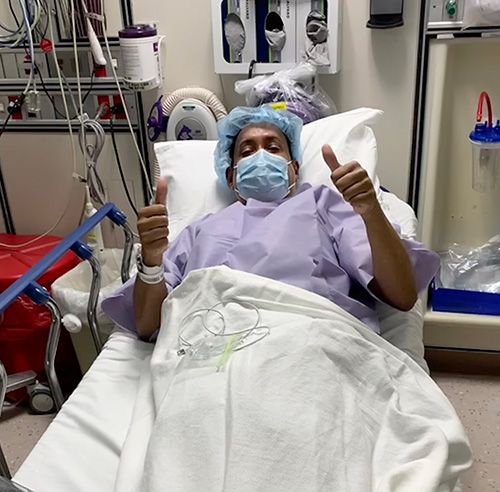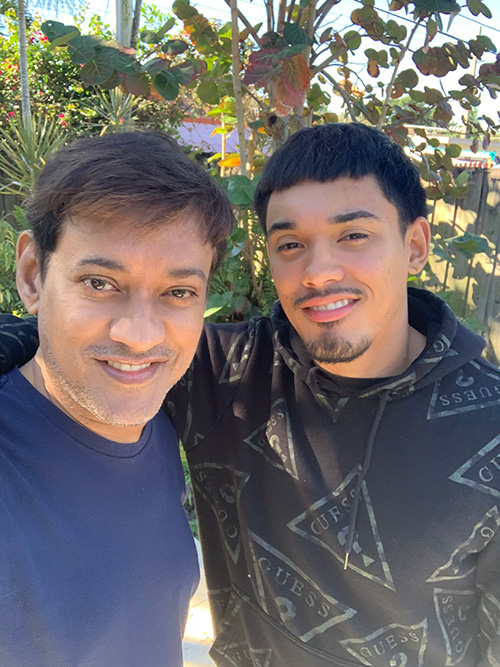Cancer Patient: The Right Support is Pure Magic

When David Rodriguez was diagnosed with stage 3 prostate cancer in November, his world fell apart.
He broke down in tears when a nurse delivered the news. He kept crying when he called his sister from the parking lot. He couldn’t bring himself to call his mother or grandmother that day. His son was serving in the Marines, so he didn’t tell him either so his boy could focus on his mission.
As the days passed, Rodriguez’s body started to break down. He constantly threw up. It was a struggle to get in and out of his car.
“I could be talking to someone, having a great time, and then I’d collapse from exhaustion,” says Rodriguez, 57, an office coordinator for a retail store in Fort Lauderdale.

And then, a few weeks later, Rodriguez was referred to Sylvester Comprehensive Cancer Center and was introduced to the cancer support services available there. One by one, Rodriguez was connected to specialists, psychiatrists, therapists, and a pastor who have helped Rodriguez navigate the medical, financial, and emotional rollercoaster of a cancer diagnosis.
He found peace while creating art in the center’s art therapy classes.
He relaxed while playing drums in the center’s music therapy classes. And,he relished the massage therapy that helped his body cope and gained spiritual insight from long talks with the center’s pastor.
And he met Zelde Espinel, M.D., a psycho-oncologist who serves as a psychiatrist for cancer patients. Dr. Espinel talked Rodriguez through his anxiety and took it upon herself to manage his complicated case. She set him up with Jackie Lindeborg, a medical assistant who arranged all his appointments.
And she even connected him with an endocrinologist who discovered that Rodriguez was also dealing with Graves’ Disease. This immune system disorder affects the thyroid but can be managed if caught early enough.
“To me, (Dr. Espinel) is an angel that God sent down just for me,” Rodriguez says.
Rodriguez is one of the thousands of patients who have gone through the cancer support services, a collection of 28 full-time employees certified to treat cancer patients through 10 kinds of services.
Over the past year, the unit has:
- Distributed more than 300 wigs and head coverings for patients who lose their hair during chemotherapy sessions;
- Led patients through more than 2,500 music and art therapy sessions;
- Completed more than 4,500 nutrition assessments; and
- Conducted more than 8,500 acupuncture, massage therapy and exercise physiology encounters.
Nichole Puentes, the senior manager for business operations for the team, says she’s constantly amazed seeing how patients respond to the services.
“You awaken something in them that they didn’t even know was there,” she says. “It turns out to be so rewarding when they realize how creative they are or develop a new passion for something.”
For Rodriguez, each of those cancer support services has proved invaluable.
In December, he had his prostate removed by Mark Anthony Gonzalgo, M.D., Ph.D., using the university’s da Vinci robotic surgery system. Ever since, Rodriguez has used nearly every part of Sylvester’s Cancer Support Services.
In art therapy, he was asked to draw something that showed how he felt. He drew an “ugly” black and white chandelier that was shattered, covered in spider webs, and stained from water falling from the ceiling. When asked by the art therapist, Lindsey Weaver, M.A., A.T.R., why he drew that, he says: “Because there’s no color in my life right now.” That created the opening for Weaver to talk through Rodriguez’s pain and help him find some light.
Rodriguez didn’t expect much from music therapy and the drums that Mary Kauffman placed before him. But little by little, as Kaufmann played different music and Rodriguez drummed along with his hands, he felt himself calming down and talking openly about his life.
It was such a calming conversation that I didn’t want it to end.
David Rodriguez
Rodriguez was confused when the team arranged for massage therapy, thinking that couldn’t possibly help a removed prostate. But Karen Lipay, a licensed massage therapist, worked on his stomach and neck and left him feeling renewed.
“It gave me incredible relief for my pain,” he says.
Rodriguez was most skeptical of his appointment with Martin Powell, D.Min., the chaplain at Sylvester who holds a doctorate in ministry. Rodriguez considers himself spiritual but not religious, and he told Powell as much during their first conversation. But Powell said he wasn’t there to convert Rodriguez to any religion. His only goal is to help his patients find their own ways of overcoming the trials they’re facing.
Rodriguez says it worked wonders. He now looks forward to their chats.
“Whatever serves as their anchor or bedrock when life gets difficult, my role is to help them find that rock,” Powell says. “For some, it may be their church; it may be prayer. For others, maybe spending time with their grandkids and looking at a photo album. Chaplaincy is dynamic, it’s very broad, and it really is an honor to walk alongside people who I consider the bravest in the world dealing with this disease.”
As Rodriguez continues on his road to recovery, he says he’s found a new family at Sylvester.

Most of his relatives live in New York and his son is always on the move with the Marines. So, Rodriguez says his visits to different services in Deerfield Beach, Boca Raton, and Miami have become his salvation.
He lists the names of each of the people he’s worked with, from doctors and nurses to assistants and receptionists. When he shows up, they already know to get the coffee ready as he starts his day. When he’s home, they immediately respond to his emails.
After starting his cancer journey in a puddle of tears, Rodriguez is now hopeful for his future.
“Finding anyone who helps you is a big challenge,” he says. “Finding an entire team of people like that, it’s pure magic. If you don’t live it, you can’t believe it.”
Learn more about Cancer Support Services at Sylvester.
Alan Gomez is a contributor to the UHealth Collective news site.
Tags: cancer care in Miami, cancer support groups, cancer support services in Miami, effectiveness of art therapy, therapy
